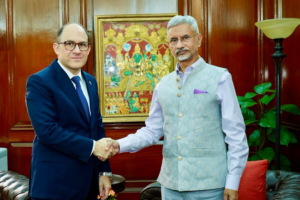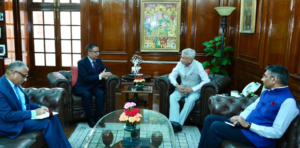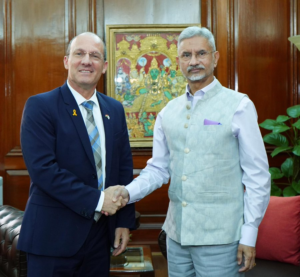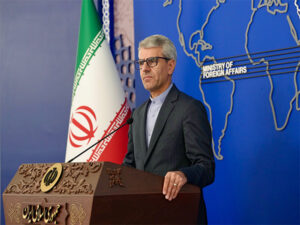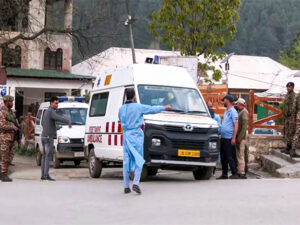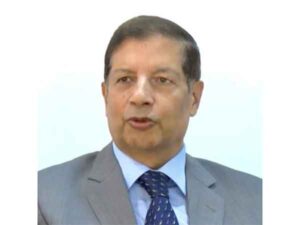Elections in Pakistan unlikely to be free and fair, says experts
London [UK], June 20 (ANI): Amid Pakistan’s deteriorating political and economic situation, experts spoke about the various factors and forces at play and expressed serious doubts about the country being able to see free and fair general elections.
In a webinar hosted by The Democracy Forum (TDF) titled ‘Repercussions of Pakistan’s descent into anarchy’, the commentators discussed about the current events in Pakistan that will affect the entire South Asia region, impacting the poor in particular and driving the nation to the point of political and economic implosion.
In his opening comments, TDF President Lord Bruce said of Pakistan’s scheduled October election for its National Assembly that amidst a deteriorating political and economic scenario, many commentators believe it is very unlikely to be free and fair, further attenuating the already fragile nature of democracy.
“With the ruling PDM coalition government forced to make unpalatable fiscal reforms as a consequence of reviving a stalled IMF programme, the resulting cost-of-living crisis has given the opposition PTI party, led by Imran Khan, a chance to revive its fortunes through the forthcoming election”, said Bruce.
Khan’s May 9 detention on corruption charges by paramilitary troops of the National Accountability Bureau (NAB) led to violent civil disturbances in Punjab, Khyber Pakhtunkhwa, and later in Lahore and Rawalpindi. While Pakistan’s supreme court overruled the arrest and ordered Khan’s release, with chief justice Umar Ata Bandial declaring the NAB had acted illegally, the government was quick to condemn this decision and let it be known that Khan would be arrested again.
A further crackdown on May 25 resulted in the arrest of thousands of PTI party members, while pressure was applied to Khan’s political allies to quit politics.
At the very heart of this political crisis, said Lord Bruce, lies the deep personal enmity between General Asim Munir, Chief of the Army Staff, (COAS) and Imran Khan. “Their feud dates from June 2019 when Munir was sacked by Khan as Director General of Inter-Services Intelligence.
Bilal Gilani, executive director of the pollster Gallup Pakistan observes: “Pakistan’s future (is) likely to be decided not by elections or public opinion, but by who (wins) the power battle between the military and Khan”, with one side having “the ability to bring the public out; the other… the ability to bring the arms out.”
Lord Bruce also cited political historian Ahmed Rashid’s suggestion that Pakistan faces ‘the worst crisis since 1971’, with three major challenges concurrently which appear to have no solution in sight: first, the principal institutions of state – the judiciary, parliament and the military – are at war with each other; second, the security of its international border with Afghanistan is threatened by rampant terrorism; third, the economy is in dire straits with inflation now running at 37 per cent, and likely to rise further, while the country’s external public debt and liabilities now exceed USD 126 billion – of which 20 per cent is owed to Chinese lenders, creating considerable repayment and debt servicing pressure.
Islamabad-based writer, physicist and activist Dr Pervez Hoodbhoy noted that Imran Khan, who rose to power on the shoulders of the army, was a political novice whom the military believed shared their values – a supporter of the Taliban, anti-India, involved in the Punjabi establishment, hence the ideal candidate for PM.
“His time in power was a rough period, due to mismanagement and his links with groups such as the militant TLP, who demanded that Pakistan sever relations with France over blasphemy issues. Khan agreed and hosted TLP leaders in his office. And when Kabul fell to the Taliban, Imran Khan lauded this,” said Hoodbhoy.
Khan did not, argued Hoodbhoy, attack the army – to some degree a stabilising force in Pakistan – for making India his country’s perpetual enemy, or for putting the Afghan Taliban in power, etc – he attacked it because it withdrew its support for him.
Hoodbhoy also highlighted the difficulties in the US-Pakistan relationship, as the Americans have taken a step back and the Pakistan economy has become a ‘war economy’.
Although Dr Hoodbhoy felt the seminar title was less apt now as things in Pakistan were starting to stabilise to ‘a normal state of crisis’, he said the economy is running out of steam and it will be only a matter of months before Pakistan reaches an inflection point.
Dr Harlan Ullman, a Senior Advisor at the Atlantic Council and a former advisor to Pakistan Prime Minister Benazir Bhutto, spoke of seminal events that had tested the US’ relationship with Pakistan, leading to Washington regarding Islamabad as more of an enemy than a friend, including assassinations and various terrorist incidents.
Ullman argued that the US does not see engagement with Pakistan as worthwhile in the wake of the evacuation of Kabul, the ongoing feudal system whereby political and economic power are concentrated in the hands of a few families, political turmoil and the Imran Khan debacle.
“Today, the US is much more interested in India as part of the Quad, and while China has some remaining interest in Pakistan, it also has other interests,” said Ullman.
One area where Ullman was less concerned than others was in the security of Pakistan’s nuclear weapons, as the country has a three-key system which would make it very difficult for them to fall into the hands of terrorists.
Ultimately, however, Pakistan could be a hotspot that could exceed Taiwan or Ukraine. There is no desire on the part of the army to have an external crisis, given the state of Pakistan’s economy, said Ullman, concluding that Pakistan, as a polity, was on the point of no return.
Offering a more optimistic view was Dr Sumrin Kalia, a postdoctoral fellow at the Institute for Global Prosperity, University College, London, who joined the debate from Karachi, where, she said, life was relatively normal due to a vibrant civil society that is capable of being democratic.
“Civil groups are not coming out in support of Imran Khan because he did not invest in grass-roots democratic groups, and his politics were mainly theatrics. Yet the State has not really been able to connect with the people; and when they are not heard, they can turn to populist forces such as Khan,” said Dr Sumrin Kalia.
For senior Bangladeshi journalist and author Syed Badrul Ahsan, Pakistan has been on an unfortunate journey as far as elections are concerned. After its first election took place at a provincial level in March 1954, it took nine years for a constitution to be framed, though it did not survive for more than two years before martial law took hold. While the notion of ‘basic democracy’ was introduced by former President General Ayub Khan, it was actually a blow to democracy as it did not include all the people.
Ahsan argued that Pakistan has never had democracy in the true sense, so the idea of the country going back to democracy is not accurate. Pakistan’s military rulers have long put pressure on civilian rulers and, although elections will be held, to what extent will the election commission prevail? You can be sure, Ahsan concluded, that the army will not release its hold on politics.
“In Pakistan, governments are in office but not in power – behind them will always be the army.” But he too struck a cautiously optimistic note: he did not think Pakistan was descending into anarchy as some kind of hope can be derived through Imran Khan’s followers. For the first time, the civilian population has erupted in anger, and the army will have to bear this in mind,” said Ahsan.
Military coups are usually used to remove governments, argued Tim Willasey-Wilsey, a former senior British diplomat and currently visiting professor at King’s College, London.
“So, the big difference in Pakistan today is that the army is acting against an opposition party, not the government, which is still in place,” said Wilsey adding that the army likes being popular and sees itself as the guarantor of Pakistan’s nationhood. But it has become unpopular, acting against the crowd, which may lead to an antagonistic relationship with the people, as has happened in Myanmar and Syria.
Wilsey also looked at how the demographics have changed vis-a-vis the army – whereas once the sons of the elites would join the military and progress to the top, now those sons go abroad. The officer corps now hails from the lower middle class and may lack the ability to make certain decisions, which is concerning.
Wilsey also referred to leadership styles in South Asia, with ‘smart’ leaders like Modi, who know how to act, and leaders like Khan, more populist than bright. State mechanisms, both in Asia and elsewhere, are, he concluded, failing to control populist leaders.
TDF Chair Barry Gardiner MP lamented the military’s clampdown on opposition within Pakistan’s politics, as he believed that this was destroying the capacity to have important democratic dialogue, which he found deeply worrying.
Pakistan, he concluded, is in a position whereby democratic norms are being lost, and with their absence, winds are blowing that could impact everyone.

